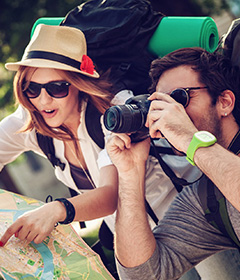Embarking on a journey to foreign lands can profoundly alter the way you perceive the world around you. The act of immersing yourself in unfamiliar cultures, landscapes, and experiences has the power to reshape your cognitive processes, challenge your preconceptions, and broaden your understanding of human diversity. This transformative effect of travel extends far beyond the duration of your trip, often leading to lasting changes in how you approach everyday situations and interpret your surroundings.
Cultural relativism and cognitive restructuring through travel
When you step outside the comfort of your familiar environment, you’re confronted with a myriad of different customs, beliefs, and ways of life. This exposure to cultural diversity can lead to a phenomenon known as cultural relativism—the understanding that cultural norms and values are relative to the society in which they exist. As you navigate through foreign cultures, you begin to realize that your own cultural assumptions are not universal truths but rather products of your specific upbringing and societal context.
This realization can trigger a process of cognitive restructuring, where you start to question and reevaluate your own deeply held beliefs and attitudes. You might find yourself challenging stereotypes you didn’t even know you had, or discovering new perspectives on issues you thought you understood completely. This cognitive flexibility can have a profound impact on how you approach problems and interact with others in your daily life back home.
For example, after experiencing the communal dining practices in countries like Morocco or Ethiopia, you might start to view mealtimes differently, perhaps placing more emphasis on the social aspects of eating rather than just the nutritional value. Similarly, witnessing the concept of siesta in Mediterranean countries could lead you to reconsider your own work-life balance and the importance of rest in productivity.
Neuroplasticity and experiential learning in novel environments
The brain’s ability to form and reorganize synaptic connections, especially in response to learning or experience, is known as neuroplasticity. Travel provides an ideal environment for stimulating this neuroplasticity through constant exposure to new stimuli and challenges. As you navigate unfamiliar territories, your brain is forced to create new neural pathways, enhancing your cognitive abilities and potentially improving your problem-solving skills.
Hippocampal activation and memory formation in unfamiliar settings
The hippocampus, a region of the brain crucial for memory formation and spatial navigation, becomes particularly active when you’re in new environments. As you explore foreign cities or natural landscapes, your hippocampus works overtime to create cognitive maps of these unfamiliar spaces. This heightened activity can lead to improved memory function and spatial awareness, which may persist long after you’ve returned home.
Research has shown that individuals who travel frequently tend to have better episodic memory—the ability to recall specific events and experiences. This enhanced memory function can translate into improved performance in various aspects of your daily life, from remembering important details at work to recalling personal experiences with greater vividness.
Prefrontal cortex stimulation: Decision-Making in foreign contexts
When you’re traveling, you’re constantly faced with new decisions—from choosing which street to take in a labyrinthine medina to deciding whether to try an exotic local delicacy. These decisions stimulate your prefrontal cortex, the area of the brain responsible for executive functions such as planning, decision-making, and impulse control.
As you become more adept at making quick decisions in unfamiliar contexts, you may find that this skill transfers to your everyday life. You might become more confident in your ability to handle unexpected situations at work or in your personal life, approaching challenges with a newfound sense of adaptability and resourcefulness.
Amygdala regulation: emotional processing of Cross-Cultural experiences
The amygdala, often referred to as the brain’s emotional center, plays a crucial role in processing and regulating emotions. Travel experiences, particularly those that involve intense cultural immersion, can help modulate amygdala activity, leading to improved emotional intelligence and stress management.
Encountering unfamiliar social norms or communication styles can initially trigger stress responses. However, as you learn to navigate these situations, your amygdala becomes better at regulating emotional responses to novel stimuli. This can result in increased emotional resilience and a greater capacity to handle ambiguity and uncertainty in your daily life.
Socio-economic paradigm shifts Post-Travel
Travel has the potential to dramatically alter your understanding of global socio-economic realities. Witnessing firsthand the disparities in living standards across different countries can lead to a profound shift in how you perceive wealth, poverty, and social structures. This newfound perspective often translates into changes in your consumption patterns, career choices, and overall life priorities.
Gini coefficient awareness: income inequality across global destinations
The Gini coefficient, a measure of income inequality within a nation, becomes more than just an abstract concept when you travel. Observing the stark contrasts between affluent neighborhoods and impoverished areas in cities around the world can make you acutely aware of the realities of income distribution.
This awareness might influence your views on social policies back home, or inspire you to become more involved in initiatives aimed at reducing inequality. You may find yourself more inclined to support fair trade products or donate to international development causes after witnessing the effects of global economic disparities firsthand.
Circular economy models: sustainability practices in Eco-Tourism hotspots
Visiting eco-tourism destinations can expose you to innovative sustainability practices and circular economy models. You might encounter zero-waste communities in Bali, renewable energy initiatives in Costa Rica, or advanced recycling systems in Scandinavian countries. These experiences can inspire you to adopt more sustainable habits in your daily life and potentially influence your professional choices.
For instance, after seeing how some communities manage to thrive with minimal environmental impact, you might be motivated to reduce your own carbon footprint or even pursue a career in sustainable development. The concept of circular economy might become a guiding principle in your consumer choices and business decisions.
Social capital accumulation through international networks
Travel provides unique opportunities to build diverse social networks across cultures and borders. This accumulation of social capital can have far-reaching effects on your personal and professional life. The connections you make while traveling can lead to new job opportunities, cultural exchanges, or collaborative projects that transcend geographical boundaries.
Moreover, the experience of forming friendships with people from different backgrounds can enhance your intercultural communication skills and empathy. These soft skills are increasingly valuable in today’s globalized workplace and can give you a competitive edge in your career.
Linguistic relativity and cognitive flexibility in multilingual environments
Immersing yourself in multilingual environments while traveling can have profound effects on your cognitive processes. The concept of linguistic relativity, also known as the Sapir-Whorf hypothesis, suggests that the structure of a language influences its speakers’ worldview and cognitive processes. By exposing yourself to different languages, you’re not just learning new words, but potentially new ways of thinking.
For example, learning a language that has no future tense, such as Mandarin Chinese, might subtly alter your perception of time and future events. Similarly, encountering languages with more precise color terms than your native tongue can enhance your ability to distinguish between different hues. This linguistic exposure can lead to increased cognitive flexibility, allowing you to approach problems from multiple perspectives and think more creatively in your everyday life.
Moreover, the mental exercise of switching between languages can improve your multitasking abilities and cognitive control. Research has shown that bilingual individuals often perform better on tasks requiring attention switching and conflict resolution. Even if you don’t become fluent in a new language during your travels, the mere exposure to different linguistic structures can stimulate your brain and enhance your cognitive abilities.
Psychogeography: urban exploration and spatial awareness transformation
The concept of psychogeography, which explores the emotional and behavioral impact of urban environments on individuals, takes on new dimensions when applied to travel experiences. As you navigate through foreign cities, your perception of urban spaces and your own place within them can undergo significant transformations.
Flâneur methodology: deriving meaning from parisian streetscapes
The flâneur , a concept popularized by Charles Baudelaire, refers to the urban explorer who wanders the city streets, observing society. Adopting this methodology while traveling can lead to a deeper understanding of urban dynamics and social interactions. For instance, spending time as a flâneur in Paris might reveal the intricate social fabric of café culture or the unspoken rules of public space usage.
This practice of mindful urban wandering can translate into a more observant and reflective approach to your own local environment upon returning home. You might find yourself more attuned to the subtle rhythms of your city, noticing details and patterns that previously escaped your attention.
Situationist international techniques in bangkok’s urban fabric
The Situationist International movement developed techniques like the dérive (unplanned journey through urban landscapes) to challenge conventional ways of experiencing cities. Applying these techniques in a vibrant, chaotic city like Bangkok can lead to surprising discoveries and insights into urban life.
Engaging in a dérive through Bangkok’s maze-like streets and alleyways might reveal hidden temples, bustling local markets, or quiet oases amidst the urban chaos. This experience can encourage you to approach your own city with a similar sense of curiosity and openness, potentially discovering new aspects of your familiar environment.
Architectural determinism: built environment impact on traveler cognition
The theory of architectural determinism posits that the built environment significantly influences human behavior and cognition. Experiencing diverse architectural styles and urban layouts while traveling can heighten your awareness of how physical spaces shape social interactions and individual experiences.
For example, contrasting the communal living spaces in a Balinese compound with the privacy-focused designs of Scandinavian homes can provide insights into how architecture reflects and reinforces cultural values. This heightened awareness of the built environment’s impact can influence how you interact with and potentially modify your own living and working spaces upon returning home.
Culinary neuroscience: gastronomic experiences and sensory perception alterations
The act of experiencing new cuisines while traveling goes beyond mere gustatory pleasure; it can fundamentally alter your sensory perceptions and neural pathways associated with food. Culinary neuroscience explores how our brains process and respond to different flavors, textures, and aromas, and travel provides a rich laboratory for this field of study.
When you taste unfamiliar dishes, your brain forms new neural connections, potentially enhancing your ability to discern subtle flavors and appreciate complex taste combinations. This heightened sensory awareness often persists after your return, influencing your food choices and cooking habits in your everyday life.
Moreover, the cultural context of food experiences while traveling can lead to a deeper appreciation of the role of cuisine in social bonding and cultural identity. You might find yourself more inclined to explore diverse cuisines in your home country or to incorporate new ingredients and cooking techniques into your daily meals.
Culinary exploration during travel not only expands your palate but also broadens your cultural understanding and enhances your sensory acuity.
The neuroplasticity stimulated by novel gastronomic experiences can have far-reaching effects on your overall sensory perception. You might become more attuned to subtle scents in your environment or more appreciative of textural contrasts in everyday objects. This heightened sensory awareness can enrich your daily experiences, making you more mindful of the sensory details that often go unnoticed in familiar surroundings.
In conclusion, travel has the power to fundamentally alter your perspective on everyday life through a combination of neurological, psychological, and cultural influences. From reshaping your neural pathways to challenging your socio-economic views, the experiences gained through travel can lead to lasting changes in how you perceive and interact with the world around you. As you return to your daily routines, you may find that the insights and skills acquired during your journeys continue to influence your thoughts, decisions, and actions, enriching your life in unexpected ways.


